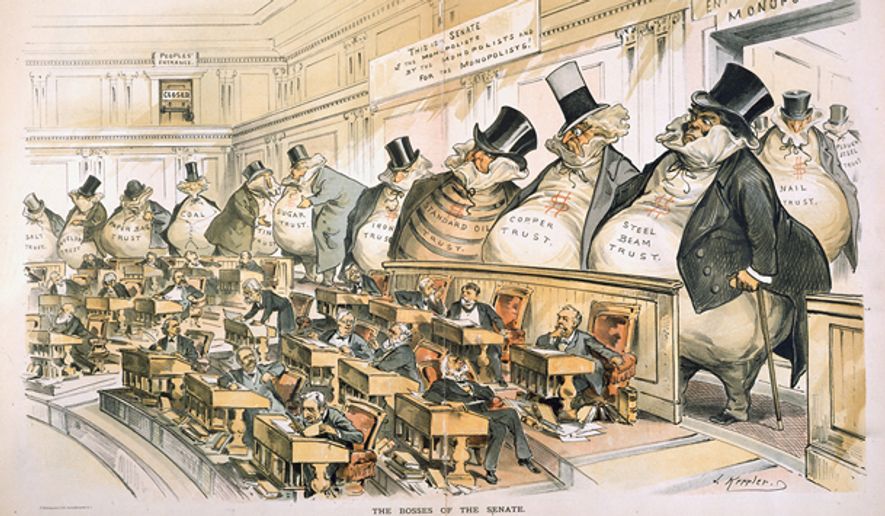ANALYSIS/OPINION
Big Music is maneuvering to eviscerate longstanding antitrust consent decrees. It is stooping to signature crony capitalism tactics of the type that have fueled political upheaval during the 2016 election cycle: lobbying Congress and the Executive Branch to make consumer welfare subservient to special interests. Its maneuvers are first cousin to the Stop Online Privacy Act and Protect Intellectual Property Act, which were killed in 2012. If Big Music’s arguments were sound, music consumers would be shouting their support in unison.
The American Society of Composers , Authors and Publishers (ASCAP) and Broadcast Music Inc. (BMI) are performing rights organizations (PROs) that control the rights to approximately 90 percent of all music compositions. They collect and distribute license fees for songs on behalf of composers, songwriters and music publishers.
In 1890, Congress enacted the Sherman Antitrust Act to prohibit unreasonable, i.e., consumer unfriendly, restraints of trade in interstate commerce. The Act has been acclaimed by the U.S. Supreme Court as the “Magna Charta of free enterprise.” Congress understood that monopoly is a narcotic and competition a stimulus to efficiency and innovation.
In 1941, the U.S. Department of Justice negotiated antitrust consent decrees with ASCAP and BMI in United States v. ASCAP, 41 Civ. 1395 (S.D.N.Y.), and United States v. BMI, 64 Civ. 3787 (S.D.N.Y.) (“Consent Decrees”) to promote the welfare of music consumers.
Generally speaking, the Consent Decrees require the PROs to provide a license upon request, prohibit discrimination among similarly situated licensees, and provide a rate-court process to settle any disputes that may arise over the terms and conditions of a license.
Before the Consent Decrees were entered, restaurants and businesses were saddled with the heavy burden of negotiating license terms with every shareholder in a music copyright no matter how miniscule (fractional licensing). A one percent shareholder enjoyed the same bargaining power as a 99 percent shareholder. The cost of music was artificially inflated.
The Consent Decrees are 75 years old, which strongly militates against any alteration. As Justice Louis Brandeis taught, in most cases “[i]t is more important that the applicable rule of law be settled than that it be settled right.” A mutability of the laws upsets legitimate expectations or reliance interests and chills investment. James Madison, father of the U.S. Constitution, rhetorically asked in Federalist 62, “What farmer or manufacturer will lay himself out for the encouragement given to any particular cultivation or establishment, when he can have no assurance that his preparatory labors and advances will not render him a victim to an inconstant government?”
On May 15, 2016, ASCAP paid a $1.75 million to settle a Consent Decree dispute with the U.S. Department of Justice. It arose over ASCAP’s compliance with a prohibition on exclusive licensing agreements with individual songwriters and publishers, which diminishes licensing suppliers for music buyers such as restaurants or businesses.
Among others, ASCAP and Sony Music are now lobbying to cripple the Consent Decrees by restoring fractional licensing; and, permitting major music publishers to selectively withdraw rights to certain songs and to license those rights outside the Consent Decrees to individuals (a process known as partial withdrawals). Neither ASCAP nor Sony is a failing company which might justify some relaxation in the antitrust laws. In 2014, for instance, ASCAP revenues soared past $1 billion.
Moreover, the U.S. Supreme Court has underscored that the touchstone of the Sherman Act is consumer welfare in Brooke Group Ltd. V. Brown & Williamson Tobacco Corp., 509 U.S. 209, 221 (1973), and companion cases. It speaks volumes that music consumers are not clamoring for altering the Consent Decrees. If they are squeezing competition, consumers would be the first to feel the pinch.
Shouldn’t ASCAP’s lobbying to emasculate the Consent Decrees be buried alongside SOPA and PIPA?




Please read our comment policy before commenting.